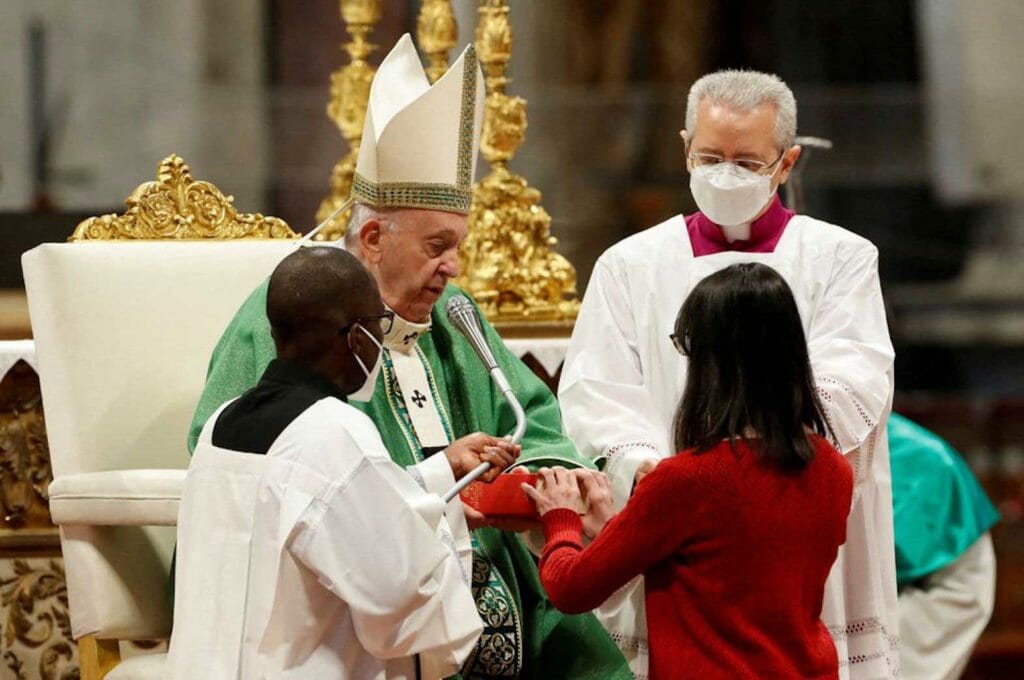
A new lector receives a gospel from Pope Francis during a Holy Mass held every year on the third Sunday of January to celebrate and study the Word of God, in St. Peter’s Basilica at the Vatican, January 23, 2022. REUTERS/Remo Casilli
The lay person cannot celebrate the Eucharist, and neither can he remit sins nor anoint the sick. But Vatican II insists that not only the ordained minister, but also every Christian – by virtue of Baptism – is a priest, prophet, and king, in accordance with the triple functions of Christ. “Every Christian is a missionary disciple.”
Pope Francis moved the Vatican Council II official teaching Apostolicam actuositatem, “Apostolate of the Laity,” to the next level. The Jesuit pontiff, through a 54-page apostolic constitution Praedicate Evangelium or “Preach the Gospel,” published on March 19 of this year, opened up top Vatican leadership roles to any baptized lay person, including women.
This model and its rationale may be applied at the diocesan level, in which more space should be created for lay people, including positions of leadership, which is part of Pope Francis’ attempts to address clericalism in institutional structures and systems.
Even after Vatican II, the hindrance for more lay leadership in Church governance has been the conjecture that it is only the ordained minister who can govern. Praedicate Evangelium changes all that, and rules that Vatican and diocesan positions of responsibility are based on the charism and mission that an individual has received rather than sacred ordination.
It’s unprecedented because, for the first time, lay persons may now lead or preside over some of the most important offices of the Roman Curia, previously headed by either a cardinal or an archbishop.
These offices include the Disciplinary Commission, APSA or the Holy See’s treasury, Telecommunications and Information Systems of Vatican City State, Governorate of Vatican City State, Dicasteries for Promoting Integral Human Development; for Laity, the Family and Life; and for Dicastery for Communication, and Synod of Bishops.
God’s precious gift of being a priest or a bishop is something eternally beautiful in itself. Be that as it may, the hierarchy is not meant for itself. In other words, the hierarchical authority is intended to serve God’s faithful people, never ever designed for the top but meant for those considered in the bottom of the pyramid.
The hierarchical constitution is God’s gift to the pilgrim People of God, yes, definitely. Lay leadership is also God’s gift to the Church. Pope Benedict XVI once indicated that co-responsibility demands a change in mindset and that the laity should not be regarded as “collaborators” of the clergy but as “co-responsible” for the Church’s being and acting.
The Vatican structural changes signaled to bishops around the world to start the unconventional designation of lay Catholics of good standing as chancellors and heads of diocesan commissions, formerly occupied by ordained ministers.
Lay Catholics share “co-responsibility,” as Pope Benedict XVI has suggested, if they become active participants in the Church leadership, not as staff or secretaries but leaders with voting rights.
“My vision is a participatory Church,” said Most Rev. Jose Rapadas III in 2019 after his installation as Bishop of Iligan, “allowing even the ordinary people in the barrios to participate in the leadership, mission and life of the Church.”
Priestly vocation everywhere is declining and most clergy are burdened with paper and office work. With the bishop’s firm resolve, some outstanding lay Catholics may be appointed parish/diocesan administrators so that the clergy could do what they do best: The pastoral and spiritual tasks specifically assigned to them.
Expressing my own thought experiment on this, the ordained ministers of Iligan, Pasig, Capiz, Jaro, Bulacan, Ozamiz, Cavite, Malaybalay, Caloocan, and other dioceses will one day disengage from their secondary roles as parish administrators (maintenance, finances, human resources, fiesta preparation), school managers, diocesan office managers, church construction supervisors and fundraisers.
Suffice it to say that priests are not ordained to attend meetings but to cure a thousand souls, hence cura animarum, when all secondary duties are relegated to the laity. Then and only then are the ordained ministers spared of endless meetings, time-consuming office management, the laborious project analysis, and indefinite signing of papers.
The ordained ministers are priests and prophets first, and the fundamental objective is to perform their primary priestly and prophetic duties full time, particularly the much-needed spiritual counseling, Confession, and the Sacraments; preparation for daily Gospel talks and Sunday homilies; the continuous education of the faithful centered on the Bible; family visits, the Anointing of the Sick, and a very long list of responsibilities the laity cannot do.
Every Christian, by virtue of Baptism, and not just the ordained, is a missionary disciple personally called Jesus to go and preach the Gospel, praedicate Evangelium.
Jose Mario Bautista Maximiano is the author of Catholic Social Teachings in Contemporary Philippine History: 500 Yoc (Claretian, 2022) and Mdxxi: 500 Years Roman Catholic’ (Claretian, 2020).

